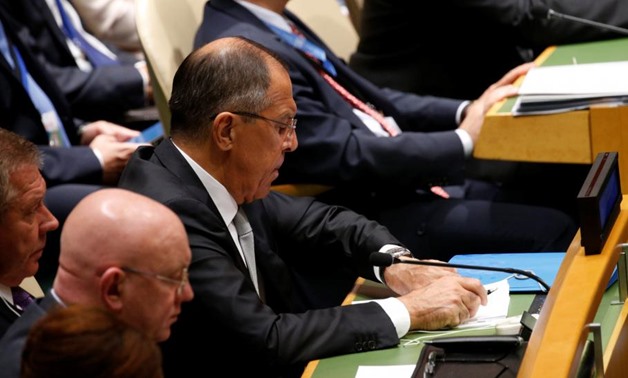
Russian Foreign Minister Sergei Lavrov checks his watch as U.S. President Donald Trump delivers his address to The United Nations General Assembly in New York, U.S., September 19, 2017. REUTERS/Kevin Lamarque
WASHINGTON - 9 December 2017: The United States is reviewing military options, including new intermediate-range cruise missile systems, in response to what it says is Russia's ongoing violation of a Cold War-era pact banning such missiles, the State Department said on Friday.
Washington is prepared "to cease such research and development activities" if Russia returns to compliance with the 1987 Intermediate-Range Nuclear Forces Treaty, State Department spokeswoman Heather Nauert said in a statement. Nauert also hinted at possible economic sanctions, saying the United States is "pursuing economic and military measures intended to induce the Russian Federation to return to compliance."
The warning was the Trump administration's first response to U.S. charges first leveled in 2014 that Russia had deployed a ground-launched cruise missile that breaches the pact's ban on testing and fielding missiles with ranges of 500-5,500 kms (310-3,417 miles).
U.S. officials have said the Russian cruise missile is capable of carrying a nuclear warhead, and that Moscow has refused to hold in-depth discussions about the alleged breach.
Russia has denied it is violating the accord. In a statement issued before Nauert's, the Russian foreign ministry said it was ready for talks with the United States to try to preserve the treaty and would comply with its obligations if the United States did.
In a statement marking the 30th anniversary of the treaty between the United States and the Soviet Union, the ministry said Moscow considered "the language of ultimatums" and sanctions unacceptable.
The U.S. allegation has further strained relations between Moscow and Washington. U.S. and Russian officials are to discuss the issue at a meeting in coming weeks of the special commission that oversees the treaty, said a U.S. official, who requested anonymity.
In the U.S. statement, Nauert said the United States "remains firmly committed to the INF Treaty and continues to seek the Russian Federation's return to compliance."
"The administration firmly believes, however, that the United States cannot stand still while the Russian Federation continues to develop military systems in violation of the treaty," she said.
The U.S. spokeswoman did not disclose the U.S. economic measures under consideration to secure Russian compliance with the treaty but offered some details on the military measures.
These, she said, involve a review of "military concepts and options" that include researching new ground-launched conventional cruise missile systems.
"This step will not violate our INF Treaty obligations," Nauert said. "We are also prepared to cease such research and development activities if the Russian Federation returns to full and verifiable compliance with its INF Treaty obligations."
Her statement came a week after Congress sent to President Donald Trump for signing a fiscal 2018 defense policy bill authorizing $58 million to develop a new INF-busting road-mobile conventional cruise missile and U.S. defenses against the Russian weapon.
The bill also called on Trump to submit to Congress a plan to impose U.S. sanctions on Russians responsible for "ordering or facilitating non-compliance" with the treaty. It was unclear when Trump would sign the bill.
The United States already has sanctions on Russian entities and individuals, including people close to President Vladimir Putin, for Moscow's 2014 seizure of Crimea from Ukraine and its alleged interference in the 2016 presidential election. Moscow denies that it interfered in the election.
A senior administration official, speaking recently on condition of anonymity, said the administration wanted to preserve the INF Treaty rather than rip it up.
"If we took the Russian approach, we'd all sort of say happy things about what a nice treaty we have and we would both go about violating it secretly," said the senior administration official. "But that's not how we roll. It's because we like arms control when it's done properly."


Comments
Leave a Comment